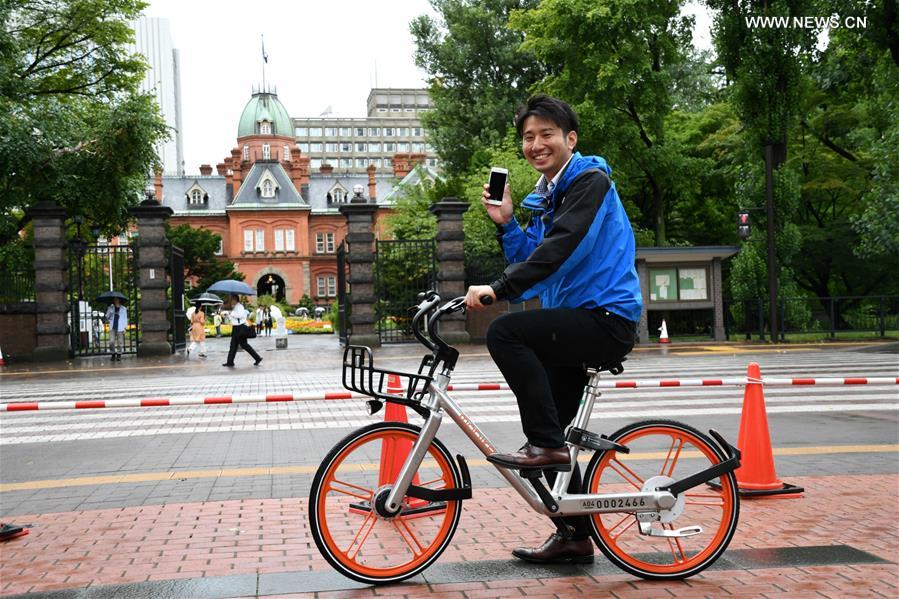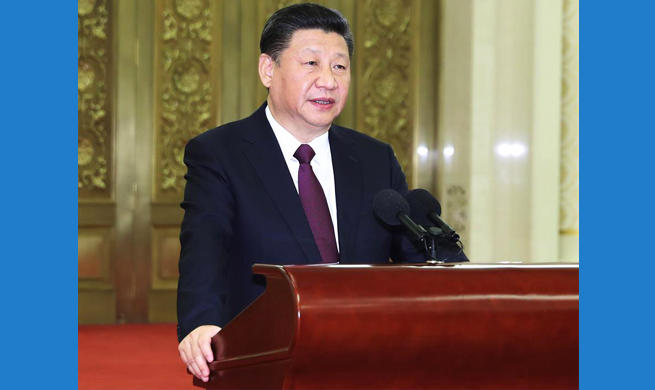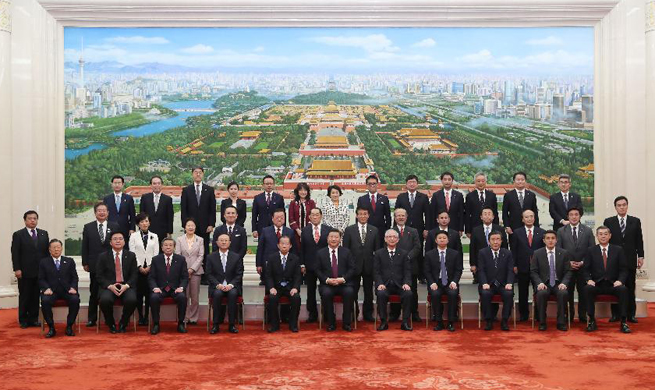
A TV reporter tries out a shared bicycle in Sapporo, Japan, on Aug. 22, 2017. Mobike, one of China's largest bike-sharing companies, launched its service in Sapporo, Japan, on Tuesday. (Xinhua/Hua Yi)
BEIJING, Dec. 29 (Xinhua) -- From "Made in China" to "Created in China," Chinese innovations are lighting up the world through reshaping people's daily lives and leading global efforts to explore the frontiers of science and technology.
Javed Dar, a photographer based in Indian-controlled Kashmir, posted a picture on Chinese social media mobile application WeChat, showing himself riding an orange-rimmed shared bike on a cycle track in Beijing.
The caption he wrote for the photo reads "bicycle-sharing is one of the innovations of China. You have a phone app, and any of the millions of bicycles scattered on sidewalks everywhere can be yours. You scan a code, you ride, you leave and lock the bike wherever and whenever after you finish your ride."
After a two-week-long trip to China, Dar became a proficient user of WeChat, an application that almost every Chinese would use as a communication tool, a social platform and even a wallet.
During his stay in Beijing, Dar recommended his family and friends to download WeChat so that they could keep in touch through free WeChat video calls.
And via the function of translation, Dar found it quite easy and efficient to understand what his friends were saying on WeChat, no matter it was in Chinese or in other languages, making possible communication without any barrier.
As one of many Chinese innovations that have completely changed people's lives, WeChat is only a glimpse of the energy and creativity in today's China.
RESHAPING WAY OF LIVING WORLDWIDE
Dockless shared bicycles, high-speed rail, mobile payment and e-commerce have earned a reputation of China's "four great new inventions" in modern times.
These innovations have completely changed people's lifestyle in China. And now they are also reshaping the way of living worldwide.
China's cashless and dockless bike-sharing scheme is going globe as two leading Chinese bike-renting companies Ofo and Mobike are competing to expand their overseas markets.
Yellow or orange bikes can be spotted on the streets of Singapore, Britain, Italy, the Netherlands, the United States and South Korea.
In Manchester, Britain, Mobike has been rolled out on city streets and is filling up the city's bike hiring requirements.
Rafael Cuesta, head of innovation at Transport for Greater Manchester (TfGM) said the community was looking for intelligent vehicles and looking at Internet of Things solutions for transport. And the customer-focused Mobike scheme fits well with the city's need of intelligent mobility.
More encouragingly, Mobike could use its digital connectivity with the shared bikes to collect data on details of all journeys made. These anonymized data would be shared with TfGM to create a better city.
In another corner of the world, technology of mobile payment has burgeoned in Manila, the Philippines and has provided customers with a digital way to pay via smartphones besides cash and cards.
GCash, a Philippine mobile wallet service provider for conducting payment and money transfer, resembles China's Alipay established by e-commerce titan Alibaba Group, who plays a leading role in China's marveling digital revolution.
People use the GCash payment app to scan QR codes put up on mall counters and with several clicks by finger, the transaction can be done within seconds.
Apart from the above, China's high-speed rail as well as the e-commerce scheme have also been introduced in many countries, bringing more convenience and benefits to other parts of the world.
LEADING TRIALS TO EXPLORE THE UNKNOWN
Changing the way of life is only one aspect. In recent years, China's innovations are also leading the world efforts to make breakthroughs in the frontier fields of science and technology.
Wukong, name of the Monkey King in the classic Chinese tale Journey to the West which literally means "understanding the void," is used to nickname China's Dark Matter Particle Explorer (DAPME).
In December, 2015, Wukong was launched. It is helping Chinese scientists lift the cloak of invisibility from dark matter.
"DAPME has opened a new window to observe the high-energy universe, showing new physical phenomena beyond our current understanding," said Chang Jin, chief scientist of DAMPE. China's dark matter detection satellite is the most powerful space probe for high-energy cosmic rays. It has the highest energy resolution and particle identification ability, perfect for searching for traces of the annihilation or decay of dark matter particles, scientists say.
In August 2016, China launched the world's first quantum satellite, Quantum Experiments at Space Scale (QUESS). It has realized the distribution of entangled photon pairs over 1,200 kilometers and has proved that quantum entanglement, described by Albert Einstein as a "spooky action," still exists at such a distance.
Nicknamed "Micius" after a 5th Century B.C. Chinese philosopher, the 600-kilogram-plus satellite was sent into a sun-synchronous orbit at an altitude of 500 kilometers.
Micius is missioned to test quantum encryption and quantum teleportation technology that could one day offer quantum communication which is hack-proof. And the test has established China as a front-runner in the field of quantum communication.
More to be listed are the Jiaolong deep-sea manned submersible, the Tiangong-2 space lab and the FAST radio telescope -- all are carrying out missions to explore the unknown.
REVOLUTIONIZING SCI-TECH SYSTEM
The vitality of China's innovation comes from the revolutionary reforms over the past five years in China's science and technology system.
Measures have been taken to encourage brain gain, increase funds and improve policies that promote innovations.
"With more than 30 years of accumulation, China's development of science and technology has experienced transition from quantity into quality," said Huo Guoqing, a professor at the University of Chinese Academy of Sciences. "It's time for breakthroughs."
Wan Gang, minister of science and technology, said China's historic transformation from copying the western world to integrated innovations has demonstrated a new concept of China to regard innovation as a primary force driving development.
At the 19th National Congress of the Communist Party of China (CPC), Chinese President Xi Jinping called for more efforts to make China a country of innovators.
"We will strengthen basic research in applied sciences, launch major national science and technology projects, and prioritize innovation in key generic technologies, cutting-edge frontier technologies, modern engineering technologies, and disruptive technologies," he said.
These efforts will provide powerful support for building China's strength in science and technology, product quality, aerospace, cyberspace, and transportation, and for building a digital China and a smart society, he said.

















